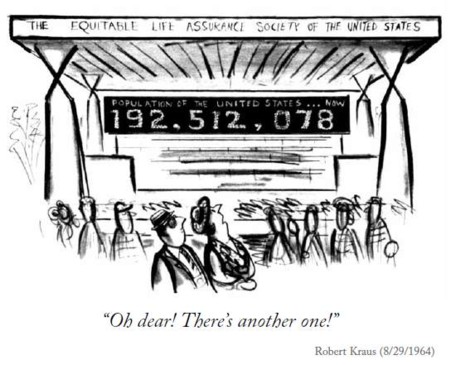Population growth
During the last 4,000 years or so the human population of the planet is thought to have been relatively stable at between a quarter and half a billion people. For the preceding 70,000 years the population was considerably smaller. Someone who believed in reincarnation could then reasonably believe the soul passed from one person to another as one died and another was born. But in the last hundred years the population has grown exponentially. There are now (2015) 7.3 billion people still alive and this number is likely to reach 11 billion before stabilising.

In this cartoon from 1964 the US population is shown as 192,512,078. By the end of 2015 this had risen to 322,354,800.
In 2015 there were an estimated 57 million deaths worldwide. This equates to around 156 thousand a day.
Anthropologists now estimate that since modern humans emerged, between 90 and 110 billion of us are already dead.
As God was rather tardy in sending his Son to save the sinners, the great majority of these people lived and died without the benefit or knowledge of Christian salvation.
But the book of Revelations suggests that at the day of judgement there will be 144,000 souls in heaven (Rev 7:4-8 ‘And I heard the number of those who were sealed, one hundred and forty-four thousand sealed from every tribe of the sons of Israel’).
This falls somewhat short of the 100 billion souls that God has reputedly handed out in the past and is exceeded every day by the present daily death rate.
While it says nothing about the possibility of an immortal soul of a Buddhist or eastern variety, it puts a fairly large hole in the orthodox Christian conception.
Even if it was argued that only the most pure confessing Christians are filtered from this large number for salvation, it suggests extremely poor quality control by God, who casts into oblivion thousands of millions of souls that He, somewhat frivolously, created before sending his son to redeem them, to say nothing of sincere believers in other religions.
But then, the book of Revelations is regarded as apocryphal by the Eastern Church and many theologians.
